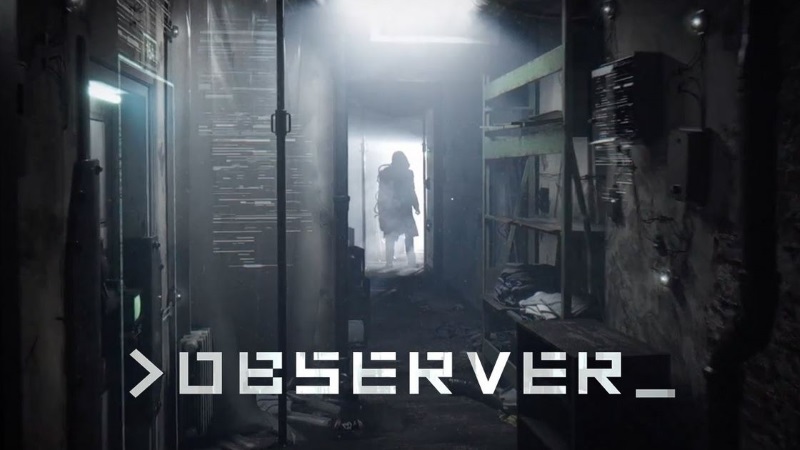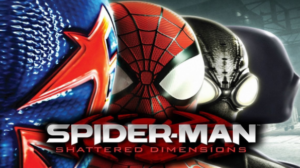Having surprised with an effective horror adventure in Layers of Fear, Polish developer Bloober Team are following it up with a more ambitious sci-fi horror cum detective adventure in Observer. How much will that ambition impact the effect of the horror on offer here though?
Observer takes place in that most interesting of gaming landscapes, a dystopian future with a cyberpunk flavour. The Game takes place in a future Poland where a post-augmentation disaster reality has become so distressing for the underprivileged that they seek any means of escape from it, including near-permanently locking themselves away in a form of virtual reality.
You are Lazarski, an ‘Observer’. Your job is investigating crimes using special augmentations for scanning and hacking organic and inorganic matter, but your most important skill is the ability to hack into the chips in people’s head and ‘observe’ their memories, hopefully leading to a deeper insight into whatever crime you’re investigating.
On this night that you inhabit Lazarski’s mind, a mysterious phonecall has led him to investigate a rundown tenement building.
Lazarski soon discovers a grisly murder, and the building ends up in lockdown for an unknown reason. Lazarski sets out to question the occupants of the building in a bid to find what he’s searching for and solve the murder he’s discovered using his unique skillset.
The opening hour is a great scene setter. The pace is deliberately slow, giving you time to survey the building’s interior, talk to residents, and understand the situation of this depressing futurescape. Walking around the ground floor gives you a clear enough picture.
The crumbling walls and distressed, creaking doorways are partially hidden by striking 3D digital ‘wallpaper’ in a cheap and cynical attempt to avoid actual renovation.
Lazarski can scan to learn more about the world and the building. Throwing in a detective mode is a nice touch, but it often takes itself a little too seriously, making the next clue a touch too obscure, which can drag you away from the wonderful build of Observer’s unsettling atmosphere with needless frustration.
People, bar the odd exception, communicate, and are seen, via the crude videophones attached to their front doors (a good way to limit character models and keep the immersion level high).
When you do meet folk face to face, they’re the ones whose minds you’ll be taking a walk through, and that’s where the horror lives.
Observer’s real world paints a picture of a particularly grim dystopia, but the headspaces you’ll uncover among the residents of the building are landscapes full of terror, oddities, and insane depictions of their owner’s memories. They act as small puzzle stages, where you must understand the individual rules for each to uncover the real world insight you’re after.
Some are as simple as retracing the recent steps of an injured man, unsure of how he was left sprawled on a bathroom floor, but that simple task is made tougher due to the head trauma that has affected the man.
The once familiar corridors of the building are besieged by (deliberate on the developer’s part) glitches, looping and objects behaving erratically.
By using problems players would normally bemoan to give visual context to the digital memory of a head trauma victim, Observer shows off Bloober Team’s design smarts, and that’s just one of many varied examples of this. To say much more would not only spoil the story, it would also cheapen the experience to just read about it.
What I can say is that nearly all of these virtual memory chunks, including the one mentioned above, share Layers of Fear’s head-messing D.N.A. as they shift perspective constantly, making you second guess where you are and how you progress, and as Lazarski probes deeper into his investigation, that mixture of reality and skewed memory seemingly bleeds together.
Lazarski needs to take special pills to keep his focus. Without them he can miss vital clues, but it becomes clear there’s more to it than that. Observer replicates Layers of Fear’s ability to slowly ramp up a sense of dread, to tease the arrival of something impending and awful.
It’s a much slower burn in reaching the payoffs here, but it certainly doesn’t stop the feeling of unease that a locked down building full of scared tenants brings, and that’s not even counting the things you see in the minds of others.
On the downside, there’s a couple of grievances that genuinely affect story immersion. Firstly, and least offensive is the occasional stuttering in how Lazarki moves, and the times the framerate decides to follow suit.
It’s never terrible or entirely off putting, but it is quite noticeable all the same, pulling you out of some moments that should have an impact on you.
The other is Lazarski himself, or rather his voice actor. While it’s a thematically appropriate choice to have Blade Runner’s Rutger Hauer star in Observer, perhaps the lead role was a step too far.
Hauer’s delivery is often quite alright, a weary gravelly voice that fits Lazarski’s humdrum investigative routine, chucking in some cutting deadpan assurance to overly aggressive tenants, and his clinically empathetic tone towards those more deserving of it.
Unfortunately there are times where he mishits his lines, forgetting to add the correct inflection in his tone. Other times it just simply sounds like he’s disinterested. It’s almost more frustrating that he’s often good in his role (and you do discover that some of his quirks do fit into the character’s own backstory).
At the very least, his voice is distinct enough that you’ll listen to it regardless, but it does drag down a game with bundles of potential.
Observer is not quite as tightly-designed and polished as Bloober Team’s previous effort Layers of Fear, but it is far more ambitious and interesting. There’s a very clear evolution of ideas cultivated in past works, and the bonkers dips into digital memories in Observer are really well executed.
This is a developer growing and improving upon a formula that has made its name. There are still lessons to be learned of course, but Bloober Team seems like it will.


